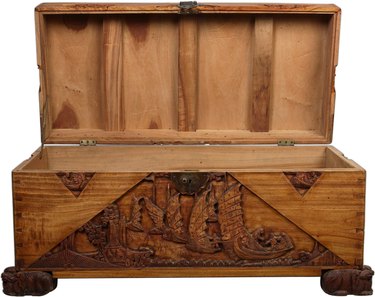
Cracking in cedar wood is irreversible and can be visually unpleasant and, in extreme cases, harmful to the structural integrity of the wood. Cracking may occur during the initial woodworking, due to the stresses to which the wood is exposed in the course of being cut, moved and fashioned. Cracking may also occur if the wood is overexposed to stress or loads in the course of use. Lastly, and of greatest concern, cracking may occur as a result of drying.
Purchasing and Storing
Video of the Day
Look for quality cedar that has been handled with care. Wood that has been cut following the grain is less likely to crack. Avoid choosing wood with obvious defects, discolorations or existing cracks. Seasoned dry wood will crack less than unseasoned wood.
Video of the Day
Once you have made your purchase, handle the wood responsibly to avoid damage during transportation and storage. If you have bought lumber rather than assembled furniture and will not be using it immediately, store the wood in a cool, dry place. If outside, put it under tarps so that it will be protected from direct sunlight and precipitation, either of which can lead to cracking.
Indoor Use
For cedar used indoors, you can apply an impermeable coating of varnish or polyurethane to the wood. This will prevent the wood from "breathing," the natural process by which the wood absorbs or releases moisture to match environmental conditions. Prolonged exposure to dry air is a major source of cracking in cedar. When cedar is exposed to dry air, the exterior of the wood will release moisture into the surrounding environment, causing the exterior to slowly shrink. This eventually forms cracks. The impermeable coating will seal existing moisture into the wood and prevent exterior shrinkage.
Outdoor Use
For cedar used outdoors, it may not be worthwhile to apply an impermeable coating as you might for cedar used indoors. Due to natural variations in the weather, the wood could rot if you prevent it from breathing. This is especially true of cedar that is still in its original log form. You can minimize cracking by using breathable coatings, but you can expect that some cracking is inevitable.